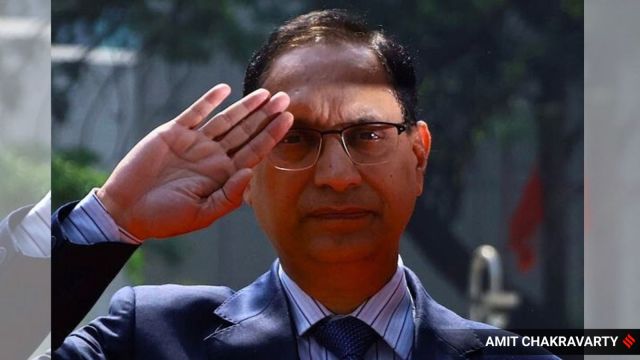New Sebi chief Tuhin Kanta Pandey vows to improve trust, plans to disclose conflict of interest in its board to public
Tuhin Kanta Pandey, who took over as the chairman on March 1, said that the capital markets regulator will engage with foreign portfolio investors (FPIs) to understand their difficulties and improve ease of operation for them.
 The statement comes as Tuhin Kanta Pandey’s predecessor Madhabi Puri Buch came under attack from US-based short-seller Hindenburg Research for having conflict of interest. (File Photo/Amit Chakravarty)
The statement comes as Tuhin Kanta Pandey’s predecessor Madhabi Puri Buch came under attack from US-based short-seller Hindenburg Research for having conflict of interest. (File Photo/Amit Chakravarty)Securities and Exchange Board of India (Sebi) Chairman Tuhin Kanta Pandey on Friday said the market regulator will come out with a plan to disclose any conflict of interest of its board members to the public as a step to improve trust and transparency.
Pandey, who took over as the chairman on March 1, said that the capital markets regulator will engage with foreign portfolio investors (FPIs) to understand their difficulties and improve ease of operation for them.
“We need to not only create trust of all stakeholders in us (Sebi) but we also need to maintain that trust. To that extent, we need to be more transparent, including on various other measures such as conflict of interest of the (Sebi) board and so on. We will be coming forward with our own plan to further transparently reveal this conflict of interest to the public,” Pandey said while addressing an event in Mumbai. It was his first public appearance after taking over as Sebi chairman.
The statement comes as Pandey’s predecessor Madhabi Puri Buch came under attack from US-based short-seller Hindenburg Research, which has now shut shop, for having conflict of interest. Hindenburg had alleged that Puri Buch and her husband, Dhaval Buch, “had stake in obscure offshore entities used in the Adani money siphoning scandal”. The Buchs had denied the allegation.
Pandey reiterated that trust and transparency, teamwork, and technology will shape the future of domestic markets.
“We must use technology to enhance transparency and ensure market institutions operate with integrity. For that, we need teamwork. Teamwork is not just within Sebi but also with others — Sebi plus all stakeholders. Together, we can build a more conducive ecosystem,” he said.
The chairman further said that increasing participation by domestic institutional investors (DIIs), including mutual funds and pension funds, has resulted in greater domestic ownership and made Indian markets more resilient.
He, however, emphasised the need for having both domestic and foreign capital to support the growth momentum. The presence of such long-term foreign capital would further support infrastructure growth, innovation, and entrepreneurship in India, Pandey noted.
“We at Sebi are conscious about the need to create a conducive environment to attract foreign capital. We will be happy to engage with FPI and AIF (alternate investment fund) industry participants to address their difficulties and further rationalise regulations to promote ease of operation,” he said.
It can be noted that foreign investors have sold over Rs 2 lakh crore since October, resulting in Sensex and Nifty falling nearly 15 per cent. “We need long term capital through both equity and debt issuances as a source of stable funding fostering sustainable economic growth,” Pandey said.
New products like real estate investment trusts (REITs), infrastructure investment trust (INVITs), and municipal bonds have huge potential to boost infrastructure development in the country. These products not only provide a diversified source of funding but also reduce reliance on traditional sources of capital, he stated.
The Sebi chairman said that the domestic securities market has played a crucial role in channelising savings into productive investments, thereby fuelling economic growth.
As of March 2020, there were 49 million unique investors in the Sebi ecosystem which is now around 136 million. Investors in mutual funds have risen 2.4 times in five years to 53 million from 22 million.
Inflows into risk-oriented mutual funds during the current year (till January) are of the order of Rs 5.3 lakh crore. Over the last 10 years, Indian companies have raised an average of Rs 2.2 lakh crore per year through equity issuance in the securities market. The current fiscal year so far (April-January) has seen a record equity issuance of Rs 4 lakh crore, twice the capital raising of Rs 2 lakh crore witnessed in the entire FY24, he said.
This access to funding through the capital market drives expansion, enhances productivity, and fosters innovation — all of which contribute to economic growth, he said.
- 01
- 02
- 03
- 04
- 05































